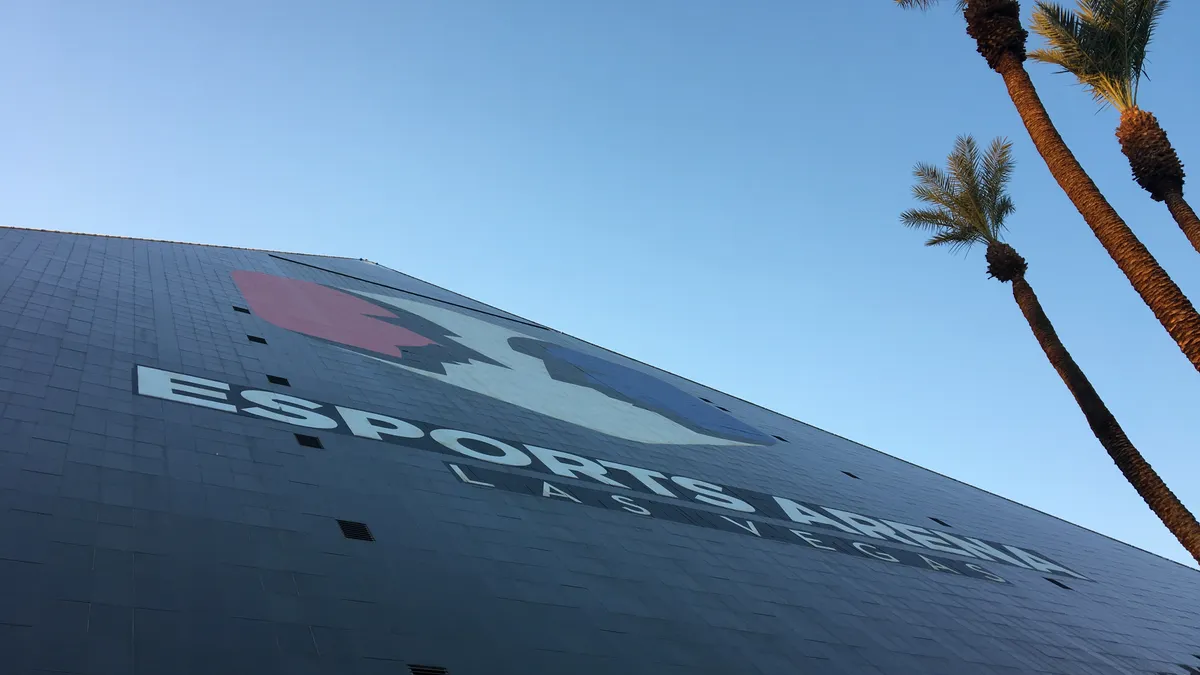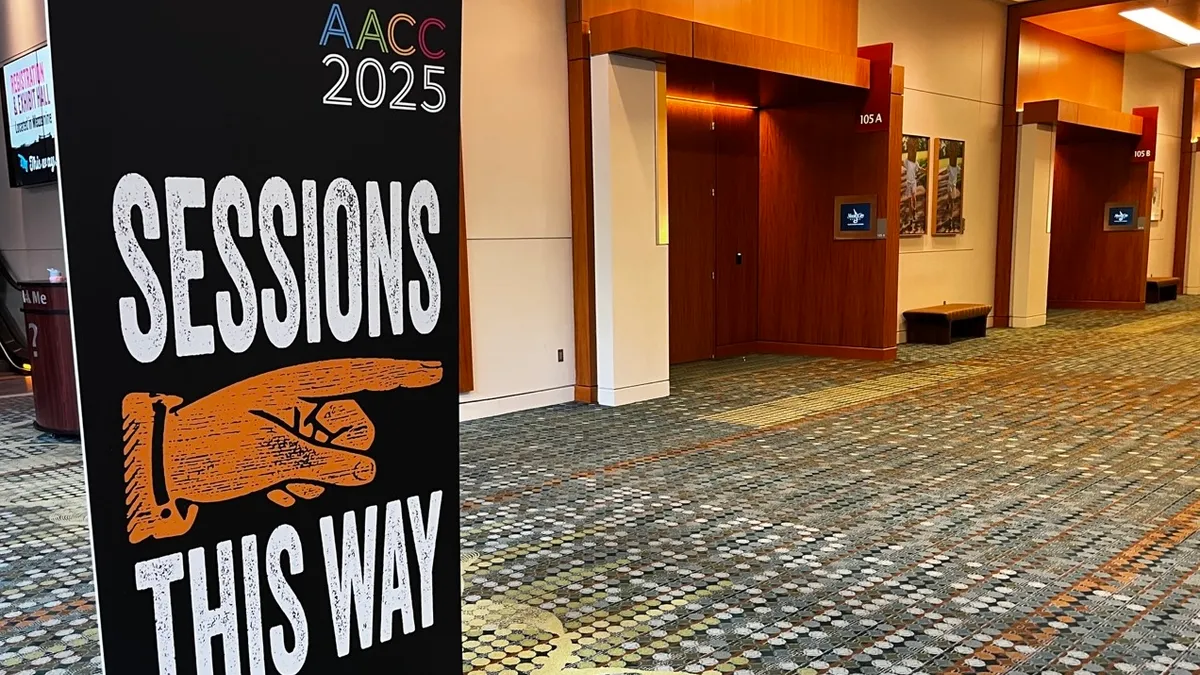At 30,000-square-feet, it’s small stakes by Vegas standards, but the Esports Arena at the Luxor shows an industry on the rise. Visitors, many of whom are locals, pay to play at more than 100 PCs and consoles set in rows and clusters throughout the two-level space.
They all frame the main event: a raised stage on which players will face off in any number of video games — including popular titles Fortnite, League of Legends and Overwatch — all while their characters' movements and their own game faces are projected on the 50-foot LED video wall behind them.
It's an unlikely sight for Vegas, though perhaps not for much longer.
The esports industry is at a tipping point. Sponsorships proliferate, franchised leagues are gaining profile, broadcast rights are on the table, and the top players are netting millions. Analytics company Newzoo expects the number of people worldwide who watch professional esports more than once a month to increase at a rate of 14.4% annually from 121 million in 2016 to 250 million in 2021. Add the people who tune in less often, and the potential market more than doubles.
Colleges are approaching esports slowly, mostly through investment in varsity and club teams, though students have been playing these games in residences halls for years. But just off the Strip, the University of Nevada Las Vegas — whose student club team 8-bit won the Mountain West Conference's inaugural Esports Showdown in March — is going a step further, teaching students about how the esports business works.
Now in its third year and cohort, the semester-long, three-credit Esports Lab course at UNLV's International Gaming Institute (IGI) explores new business models for esports. Robert Rippee, a former Sands Corp. executive and the director of the IGI’s Hospitality Lab, hopes the students will be able to provide fresh ideas to companies such as those whose resorts line the Strip. (Each cohort has 15 to 30 students.)
Education Dive visited Rippee at UNLV to learn more about how the university is approaching esports curriculum and what colleges should consider when developing esports classes.
This interview has been edited and condensed for brevity and clarity.
EDUCATION DIVE: What do you want the course to achieve?
RIPPEE: The goal is for students to come up with a vision of what a sustainable and viable esports business looks like, whether that's streaming, watching a tournament, playing at a table, having drinks, eating food, whatever it is. These casino businesses operate on very large margins — 25% to 70% for food and beverage, for example — so you’ve got to be at least a viable alternative to what they already have. Our intent was to recruit students in different disciplines because I thought the blend of them in teams as an instructional method would enhance the learning.
What are some of those disciplines?
RIPPEE: I have engineering, architecture, business, hospitality, law and gaming students, as well as professionals coming from the Strip to take the class. When you have all these types of students on the same team, you're kind of mimicking the real world. For example, architecture students understand space and how people relate to it; engineers understand technology and mechanics; and business or hospitality students are going to bring together the business models.
What did they learn?
RIPPEE: That a place you went just to play video games wasn't going to generate enough revenue. So they looked at food and beverage, retail, video, music, craft drinks, as well as streaming, tournaments and watching. It's still built around esports, but it has other elements of entertainment on the perimeter to make it a profitable and sustainable business.
How did you know the timing was right to bring esports into the curriculum at UNLV?
RIPPEE: The biggest clue was the significant growth in young people visiting Las Vegas. Every business in this city is now thinking about how to create an entertainment experience that's more relevant and enjoyable to them.
Was awareness of esports among other stakeholders an issue?
RIPPEE: It was very helpful that the first cohort were all gamers because they spoke a language that the rest of the entity needed to learn. We got a lot of publicity for the course, which was great for the university, but it also raised the level of awareness of what a gamer is and what these games are.
I held an education session here for traditional casino gaming regulators, and most of them were baby boomers. They saw what could be coming down the road in terms of regulation, different genres of the game, what competition meant, and how professionalism had entered the domain of esports.
Did you expect the program would play that educational role?
RIPPEE: I really didn't. I thought it would be a great, experimental-type seminar. That maybe we would give some great information or ideas to the casino operators. I never dreamed that I'd be talking to gaming regulators, other businesses or economic development people, or even a sports conference about the potential impact of esports.
What questions do you get from those types of people?
RIPPEE: "Explain to me why people like to watch somebody else play a video game." That's No. 1. I tell them anecdotally about my experience of going to a professional-level tournament at MGM with my son. That the energy in the room was every bit the same as going to a college basketball game. You root for a team, when they do something great you stand up and cheer and hit your clackers together. You are glued to the action. The difference is that the action is digital content on a screen and not people on a court.
Colleges are tight on resources. How should those considering esports curriculum or teams think about and message the decision to explore the new area?
RIPPEE: Every university has a large, visible or invisible, group of students who love playing these games. They're playing them every night. This lets you engage them on their own turf. Yes, the subject matter is esports, but the reality is this is a way to engage a large number of students.
I've spoken with educators at a half dozen universities about our program and they say they're thinking about it because they recognize one thing: They have a large student organization that's very engaged with students who love gaming, and they're trying to figure out whether there is a synthesis between higher education and students' passion for video games.
Do you think these programs will mostly exist outside traditional degree programs?
RIPPEE: I do, and it's an elective here. All colleges will face that same decision: How do you make it accessible to students across the institution, because that's going to decide how it is offered. Is it a 200-level or a 400-level class? It'll probably be a 400-level, because that's the first time students can fit in an elective like this.
Where should colleges who want to bring esports into their curriculum start?
RIPPEE: Begin by looking at your student body and your core competencies as a university. We were already in the gaming business and have a close relationship with industry partners. For us to create a video game development lab would have made no sense. Business models in the casinos and entertainment industry are in our backyard. If you're looking at initiatives such as tournament management and player development, you might need additional facilities.
What about career opportunities, both in Vegas and elsewhere?
RIPPEE: They could work at integrated resorts — MGM, Caesars, Sands Corp. — which are billion-dollar hospitality companies. Theater companies and theme parks are the next likely. Any entity in that kind of entertainment space is probably fair game, including the esports companies themselves. And there's a whole collection of businesses beginning to explore this space and talking about sponsorship. So if you're Geico, which is a big sponsor of esports, on their marketing team undoubtedly are people familiar with esports who advise marketing decisions such as the activation of their brand at esports events. The event management industry also is ripe for people with this background.
For colleges that don't have a gaming program, where does an esports program belong?
RIPPEE: If we didn't have the Gaming Institute, this probably would have been in the business school because we're looking at how to design and operate a sustainable business with lots of regulatory factors. There's also elements of architecture, theatrical engineering, big bandwidth, a lot of computers. Any one of those pieces is going to be a component. We're fortunate that we can take a multidisciplinary approach.
Where would you like the Esports Lab to be in five years?
RIPPEE: I'd love to see courses that add to the esports core, such as tournament management, player development, and streaming and new media. Most importantly, I'd love to see a varsity esports team here at UNLV.
What's been the hardest part of getting the lab up and running?
RIPPEE: I feel fortunate to exist in the entity where I do, the Gaming Institute, which is aligned under UNLV's Office of Economic Development. We have a very entrepreneurially minded department. Had we been in one of the traditional colleges, I think I would have felt a tremendous amount of pushback because it's a nontraditional course taught by a nontraditional faculty member. When I go to other colleges, everyone gets excited about the successes that we've had, but you still sense that, "Well, that's not the way we've done things in the past." There's a little bit of status quo bias about how higher ed is done.
You previously worked on the Strip. Did you have any sense that esports would make its way there?
RIPPEE: Yeah, I did. In 2013, I held an esports tournament for FIFA, Madden and NBA at the resort where I worked. We blocked a large sports bar out for a weekend and brought in a bunch of monitors. I remember walking in there on Saturday afternoon, and it was packed. Seeing the faces and energy in the room told me something is happening, and with an audience I'd never seen before in this casino. They were young people, and they were doing something they loved. That stuck with me.






















